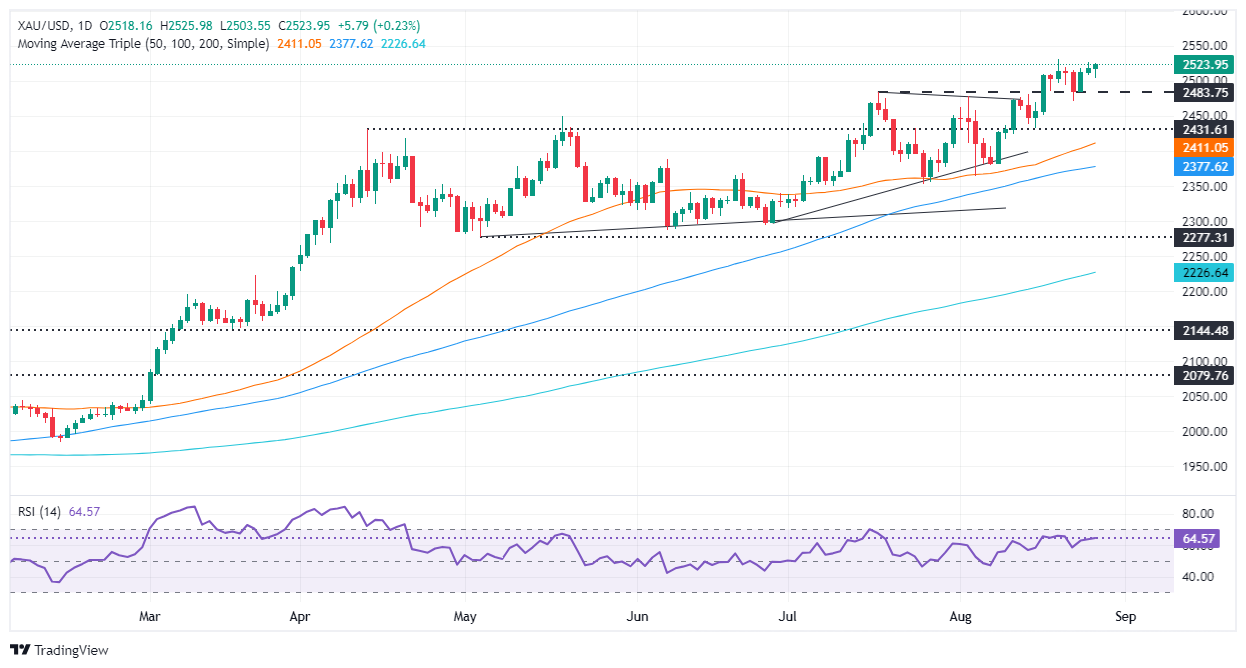- Gold rises in risk-on setting, shrugging off robust US data as the US Dollar hits a 12-month low.
- Powell’s dovish remarks keep US Treasury yields stable, pressuring the US Dollar and boosting Gold.
- Focus shifts to upcoming core PCE and job data, crucial for Fed decisions; rate cut prospects bolster Gold.
Gold prices advanced firmly during the North American session on Tuesday amid a risk-on environment and steady US Treasury yields. Investors ignored better-than-expected economic data from the United States (US), failing to underpin the already battered Greenback. The XAU/USD trades at $2,524 and gains over 0.20%.
The financial markets’ narrative has remained unchanged since Federal Reserve (Fed) Chair Jerome Powell announced last Friday that the time for lowering interest rates has come. This sent US Treasury bond yields tumbling and the US Dollar to a new 12-month low, levels last seen in July 2023, according to the US Dollar Index (DXY).
The DXY sits at 100.55 and slumps 0.31%, while the US 10-year benchmark note yields 3.829%, virtually unchanged.
American Consumers turned slightly optimistic in August, according to a poll by the US Conference Board (CB). However, traders remain laser-focused on Friday’s release of the core Personal Consumption Expenditures Price Index (PCE), the Fed’s preferred gauge for inflation, along with jobs market data with the Initial Jobless Claims report announced on August 29.
This could be a prelude to the upcoming Nonfarm Payrolls report due to the Fed’s pivot toward worrying about the labor market. The jobs market remains healthy if the number of Americans filing for unemployment claims is lower than estimates. Otherwise, the US Dollar could weaken further, creating a tailwind for Gold prices.
The December 2024 Chicago Board of Trade (CBOT) fed funds future rates contract hints that investors are eyeing 100 basis points of Fed easing this year, up from Monday’s 97. This implies that traders estimate a 50 bps interest rate cut at September’s meeting, though odds for lowering rates of that size lie at 34.5%, according to the CME FedWatch Tool.
Bullion prices received a lifeline from rising tensions in the Middle East. The Israel-Hezbollah conflict escalated over the weekend, and fears that the conflict could broaden would be positive for the golden metal.
Daily digest market movers: Gold price climbs, ignoring Consumer Confidence data
- If US economic data continues to be weak, the Gold price uptrend is likely to persist, fueling speculation about a larger rate cut by the Fed.
- US Conference Board revealed that Consumer Confidence for August came at 103.3, up from July’s upwardly revised 101.9 and exceeded estimates of 100.7.
- Gross Domestic Product (GDP) figures for Q2 in the second estimate are expected to improve from 1.4% to 2.8%.
- On Friday, the Fed’s favorite inflation gauge, the core Personal Consumption Expenditures (PCE) Price Index, will be revealed. It is expected to rise from 2.6% to 2.7% YoY.
Technical outlook: Gold’s uptrend is intact as buyers eye $2,550
Gold price’s upward bias remains, though price action during the last couple of days shows that traders are reluctant to position themselves ahead of the PCE data release.
From a momentum standpoint, the Relative Strength Index (RSI) is failing to crack its last peak, contrarily to XAU/USD price action, meaning that a negative divergence could be looming.
If XAU/USD slides below the current week’s low of $2,503 and $2,500, this would pave the way for a deeper pullback. The following support would be the July 17 high at $2,483, followed by the $2,450 psychological mark. Further downside is seen at the 50-day Simple Moving Average (SMA) at $2,410, ahead of $2,400.
On the flip side, if bullion prices clear the all-time high (ATH) of $2,531, this could sponsor a leg-up to $2,550 before challenging $2,600.

Gold FAQs
Gold has played a key role in human’s history as it has been widely used as a store of value and medium of exchange. Currently, apart from its shine and usage for jewelry, the precious metal is widely seen as a safe-haven asset, meaning that it is considered a good investment during turbulent times. Gold is also widely seen as a hedge against inflation and against depreciating currencies as it doesn’t rely on any specific issuer or government.
Central banks are the biggest Gold holders. In their aim to support their currencies in turbulent times, central banks tend to diversify their reserves and buy Gold to improve the perceived strength of the economy and the currency. High Gold reserves can be a source of trust for a country’s solvency. Central banks added 1,136 tonnes of Gold worth around $70 billion to their reserves in 2022, according to data from the World Gold Council. This is the highest yearly purchase since records began. Central banks from emerging economies such as China, India and Turkey are quickly increasing their Gold reserves.
Gold has an inverse correlation with the US Dollar and US Treasuries, which are both major reserve and safe-haven assets. When the Dollar depreciates, Gold tends to rise, enabling investors and central banks to diversify their assets in turbulent times. Gold is also inversely correlated with risk assets. A rally in the stock market tends to weaken Gold price, while sell-offs in riskier markets tend to favor the precious metal.
The price can move due to a wide range of factors. Geopolitical instability or fears of a deep recession can quickly make Gold price escalate due to its safe-haven status. As a yield-less asset, Gold tends to rise with lower interest rates, while higher cost of money usually weighs down on the yellow metal. Still, most moves depend on how the US Dollar (USD) behaves as the asset is priced in dollars (XAU/USD). A strong Dollar tends to keep the price of Gold controlled, whereas a weaker Dollar is likely to push Gold prices up.

























